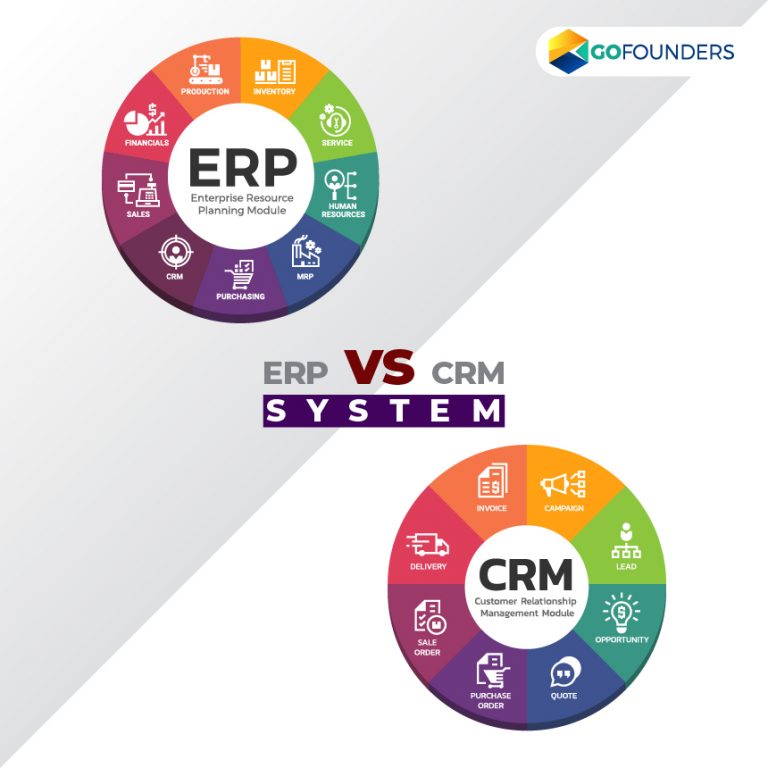
If you are a startup, a growing business or an established corporation, what systems and software you operate with have great significance concerning your efficiency and growth. While ERP (Enterprise Resource Planning) and CRM (Customer Relationship Management) are equally crucial for automating and streamlining your business operations, which one is the best choice for your business? Let’s explore that in this article-
Let’s understand ERP
Enterprise Resource Planning (ERP) software help you streamline all your business operations by keeping track of orders, revenue and transactions.
It helps you organize and handle various aspects of your business, including financial data tracking, supply chain management, and payroll management.
An ERP system is beneficial for businesses when it comes to performance improvement and effectiveness in all business transactions.
Why should you opt for ERP?
1. A single system for various business processes
An ERP system integrates various business processes, including manufacturing, supply chain, warehousing, distribution, order completion, accounting and HR, into a single system.
2. Help track the financial health
An ERP system monitor all your cash management processes, including- credits, debits, loans and cash flow etc. Thereby, help you decide the financial health of your business. It also assists you in planning your cash flow, minimizing costs, and raising revenue.
3. Monitor production process
Manufacturing and product companies can reap significant benefits from an ERP system as it helps them track various production processes- product development, production, and workflow management. It also gives real-time insight into the production schedule based on the degree of integration with production abilities, module- tracking manufacturing processes.
Let’s understand CRM
A CRM (Customer Relationship Management) software helps you automate your sales and marketing activities, maintain a customer database, catch up with leads and qualify them, keep a tab, visually track data, etc.
It facilitates consolidation of customer’s database with the help of which you can reach out to them in a better way and improve your relationship with them.
Moreover, it gathers all your sales-related activities and provides a unified customer experience which reflects increased ROI and improved customer retention.
Why should you opt for CRM software?
1. Complete visibility into the entire buyer journey
A CRM software integrates all the information about your leads and customers from their contact details, social profiles, location to their past engagement with your company. It also gets hold of the entire sales process. It allows you to gain complete visibility into the entire buyer journey.
2. Upscale productivity
A CRM system automates most of your routine tasks such as updating databases, sending emails, setting reminders etc. Thereby it allows you to catch up some free time to focus on core business activities. Thus, you can upscale the entire sales and marketing team’s productivity.
3. Monitors data visually
Most often, it’s not possible for your team to acquire actionable insight from the data collected by your prospects and customers. A proper CRM software in place may help you in this case. It allows you to monitor customer engagement regularly. Moreover, you can gain insights into stagnant deals and other revenue-generating activities with in-built analytics.
ERP Vs. CRM
Choosing between ERP and CRM is not an easy choice. A CRM takes a customer-centric approach; on the other hand, an ERP revolves around a financially-centric approach. Both of these systems have a role in contributing to the functioning of any business. However, which system you will select depends majorly on your priorities.
Let’s acknowledge some of the primary differences between ERP and CRM :
- While ERP is known for its cost-effectiveness, a CRM is inclined towards profit-making. Thus, ERP can be the best choice for established businesses seeking to streamline their core business processes by cutting operational costs.
- A CRM is all about the ways to understand your customer base and retain them in the long run. Thus, a CRM can be the best choice for the sales and marketing operations of your company.
- Where ERP improves the back-end operations like manufacturing, production, finance; supply chain; warehousing; orders and HR, CRM improves your company’s front end operations. Such as pre-sales, product marketing, inbound and outbound sales and customer success teams etc.
- ERP caters to the complex processes of various departments and is thus more expensive than CRM. However, many CRM software is not just affordable, but some of them available free as well.
- While CRMs can suffice small and large organization’s requirements, ERPs are not a great fit for startups. The reason? ERP requires a big deal of capital and human resources that might hamper the growth of startups at the development stage if they choose ERP.
- With their scalability and features, ERPs are more suitable for business that has multiple processes and can afford greater expenses. Thus, most manufacturing companies are seen opting for ERP as they seek long-term benefits born out of implementing expensive software like ERP.
- CRMs, on the other hand, are the best fit for small businesses, software companies and freelancers that incur more straightforward accounting and manufacturing process and don’t have a production segment fundamentally. Such companies can suffice their requirements like maintaining a customer database, dealing with clients, and making sales with CRM at their resort.
Concluding Thoughts
So, with the given information, what can be the right choice- ERP or CRM? You can not choose between these two just by at looking unique features. You may opt for both of these systems at any given stage of your business. CRM systems are good to start with as they are simpler, customer-centric, enables faster ROI, improves overall effectiveness etc. Whereas you may require ERP systems once your company starts getting more mature.
Thus, selecting the right system for your business should solely depend on your business requirements.


